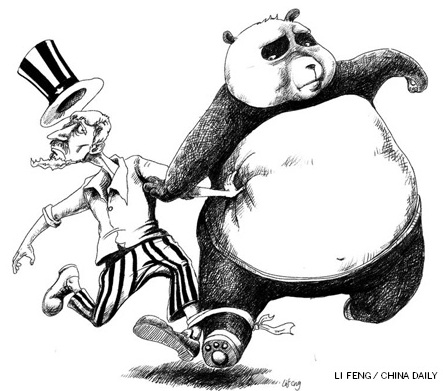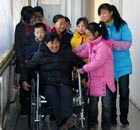Op-Ed Contributors
All hope is not lost for US and an emboldened China to make amends
By Jin Canrong and Dong Chunling (China Daily)
Updated: 2010-03-03 07:41
 |
Large Medium Small |
Sino-American relations have been on a rollercoaster ride during the Barack Obama administration. At the outset of Obama's term as president, ties between the two powers seemed to be on steady footing. But keep in mind that the honeymoon between the US and Beijing was set against the global financial crisis, when bilateral cooperation was vital. Many problems were masked by the collective effort to stop the economy's hemorrhaging.
Since China's economic outlook has turned rosier now, hidden conflicts have risen to the surface. After Obama's visit to China last November, relations have plunged to a new low, mainly because of disputes on climate change, bilateral trade, Internet censorship, the arms sale to Taiwan and Obama's meeting with the Dalai Lama.
Obama's initial policy toward China in early 2009 raised expectations that both sides would work cooperatively. The US expected China to have its full support on many issues, and China hoped that the US would show more respect to its core interests and treat the nation with fairness.
After Obama's trip, critics in the US assailed Sino-US relations and exclaimed that the joint communiqu only reflected China's interests above the US' interests. Behind the criticism lay three deep-rooted feelings against China.
The first is disappointment. In the short term, the US feels that China has not supported its views and has not complied with the US on many international issues. In the long run, China has not been Westernized despite rapid economic development, which has dissatisfied the US. Instead, the US believes China has been persistent in its "socialism with Chinese characteristics" and its own developmental model. With both the US' short and long expectations of China falling short, it is not surprising that the US feels disappointed.
The US seems to be unhappy about China's defiance, too. Along with its rising national power and international influence, China has made its voice heard at the international stage, strengthened participation in the international affairs and has become more self-confident. Since the US is used to a silent China that keeps a low profile, it still can't accommodate the growing confidence of China, and regards China's non-compliance as offensive and arrogant.
The US also feels upset by its draining superiority. The global financial crisis accelerated the decline of American hegemony and the rise of China's international status. With more balanced capabilities between China and the US, both the American government and people have gradually lost their sense of superiority in dealing with China. They feel disgruntled about the sea change.
The US has grown sensitive to China's development as well as its behavior on the international stage, prompting Washington's provocative actions against China.
A new phenomenon in this recent diplomatic row is China's more resolute response to US' provocative actions. Besides criticism, China has adopted substantial countermeasures. James Mulvenon, director of the Center for Intelligence Research and Analysis in Washington, said that China's tough stance against the US arms sale to Taiwan symbolized a "turning point".
China's resolute attitude to the US' offensive diplomacy is based on a few reasons. With its capabilities growing, China is more confident in international affairs and has more options to counter the US on its policies. China is now more competent in comprehending and using the international rules of the game. It is also more capable of clearly defining and defending its core national interests.
Rapid progress has led to another new aspect to China's foreign policies. Accompanying economic development, the Chinese society has become stronger and more diverse. State-society relations have changed and society can now exert greater influence on the decision-making process of the government. The domestic support for China's foreign policies has become more complex. China's leaders and diplomats are not making decisions in a vacuum, but are restrained by various domestic factors, such as public opinion on the Internet, interest groups, government branches and regional authorities. Sino-US relations are now subject to these factors.
Though Sino-US relations have recently gone through twists and turns, we should not be too pessimistic about the prospect of bilateral ties. Neither of the two powers is willing to return to the days of confrontation. Fundamental agreements and mature regimes for cooperation remains, and both sides need to work together to deal with global issues. Beijing and Washington have showed restraint in the most recent diplomatic spat and there is room for reconciliation.
The course of Sino-US relations will go through a more positive trend this year. Negative factors plaguing the relations may come to a halt in April. The second round of Strategic and Economic Dialogue will be held in Beijing this year, a good opportunity to repair relations and extend a hand of cooperation. Chinese and American heads of state may meet at the G20 summit scheduled in June, further stabilizing relations. Though midterm elections in November may affect Obama's policy toward China, the impact will be limited since domestic issues will dominate the election. Despite tension in the first half of the year, expect Sino-US relations to turn the corner in the second half of 2010.
The authors are researchers at the School of International Studies of the Renmin University of China

(China Daily 03/03/2010 page9)













